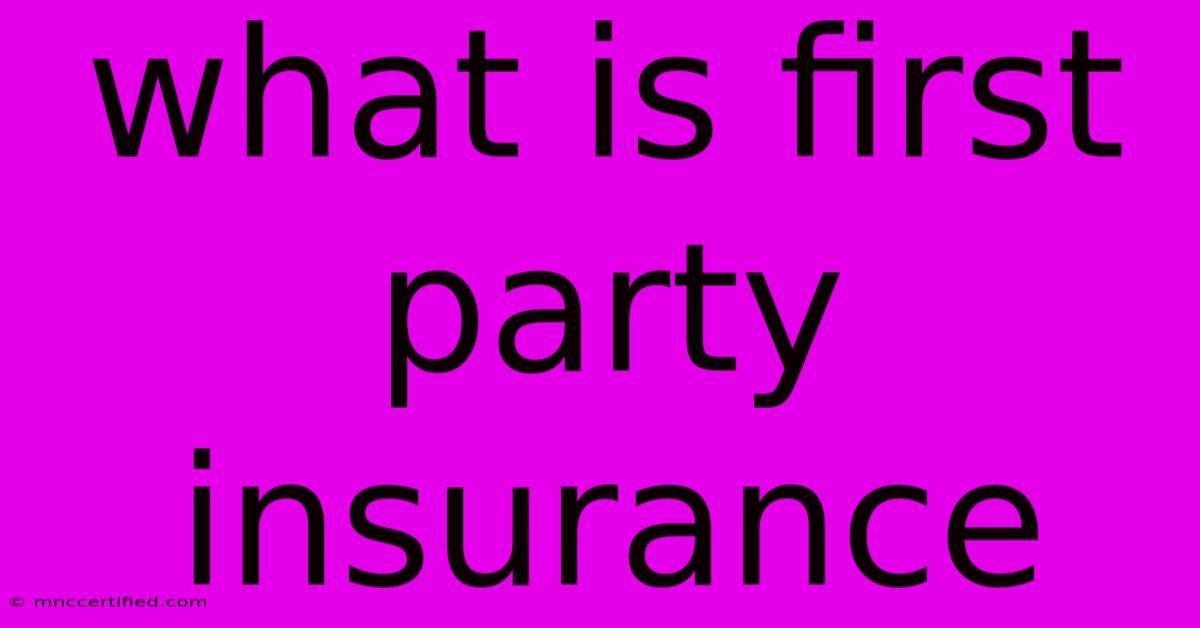What Is First Party Insurance

Table of Contents
What is First-Party Insurance? Understanding Your Coverage
First-party insurance might sound complicated, but it's a fundamental concept in personal finance. Simply put, first-party insurance covers losses or damages you suffer, regardless of who is at fault. This contrasts with third-party insurance, which covers damages you cause to others. Understanding the difference is crucial for protecting yourself and your assets.
Decoding First-Party vs. Third-Party Insurance
The core difference lies in who is covered:
- First-party insurance: Protects you from financial losses stemming from covered events, such as accidents, theft, or natural disasters. The insurance company pays you for the damages.
- Third-party insurance: Protects other people from losses caused by your actions or negligence. For example, if you cause a car accident, your third-party liability insurance covers the other driver's damages, medical bills, and property repairs.
Think of it this way: first-party insurance is about your own protection, while third-party insurance is about protecting others from your potential liability. Many policies bundle both types of coverage.
Common Types of First-Party Insurance
First-party insurance encompasses a wide range of coverage options, including:
Homeowners Insurance
This is a cornerstone of first-party insurance. It protects your house and belongings from various perils, such as fire, theft, vandalism, and sometimes even natural disasters (depending on your policy and location). It also often includes liability coverage (a form of third-party insurance), but the core benefit is protecting your property and possessions. Key aspects to consider include coverage limits, deductibles, and specific perils covered.
Auto Insurance (Collision and Comprehensive)
While auto insurance often includes third-party liability, the collision and comprehensive portions are first-party.
- Collision coverage: Pays for repairs to your vehicle after an accident, regardless of fault.
- Comprehensive coverage: Covers damage to your vehicle from non-collision events, such as theft, vandalism, hail damage, or hitting an animal.
Understanding your deductible (the amount you pay out-of-pocket before the insurance kicks in) is critical for both collision and comprehensive coverage.
Renters Insurance
Similar to homeowners insurance, renters insurance protects your personal belongings within a rented property from damage or theft. It's surprisingly affordable and offers vital protection against unforeseen circumstances.
Health Insurance
While often complex, health insurance fundamentally acts as a first-party insurance policy. You are insured against the high costs of medical treatment and care. It’s essential to understand your co-pays, deductibles, and out-of-pocket maximums.
Why is First-Party Insurance Important?
First-party insurance provides financial security and peace of mind. Unexpected events like house fires, car accidents, or theft can be devastating financially. Having appropriate first-party insurance can significantly mitigate these risks, preventing you from catastrophic financial losses.
Key benefits include:
- Financial protection: Avoid crippling debt from unexpected expenses.
- Peace of mind: Knowing you're protected from significant losses reduces stress and anxiety.
- Recovery assistance: Insurance companies can help with repairs, replacements, and other recovery processes.
Choosing the Right First-Party Insurance
Selecting the right first-party insurance requires careful consideration. Compare quotes from multiple insurers, paying close attention to:
- Coverage limits: The maximum amount the insurer will pay for a covered loss.
- Deductibles: The amount you pay before the insurance company covers the rest.
- Premiums: The cost of your insurance policy.
- Exclusions: Specific events or circumstances that are not covered by your policy.
By understanding the nuances of first-party insurance and choosing the right policies, you can build a strong financial foundation and protect yourself from life's unexpected events. Remember to regularly review your policies and adjust your coverage as your needs change.

Thank you for visiting our website wich cover about What Is First Party Insurance. We hope the information provided has been useful to you. Feel free to contact us if you have any questions or need further assistance. See you next time and dont miss to bookmark.
Featured Posts
-
Walmarts 10 Best Black Friday Deals Thanksgiving
Nov 29, 2024
-
Europa League Man Utd Wins 3 2 Thriller
Nov 29, 2024
-
Europa League Man Utd Vs Bodo Glimt Live
Nov 29, 2024
-
Confirmed Chelsea Team Vs Heidenheim
Nov 29, 2024
-
Holiday Insurance For Over 75
Nov 29, 2024